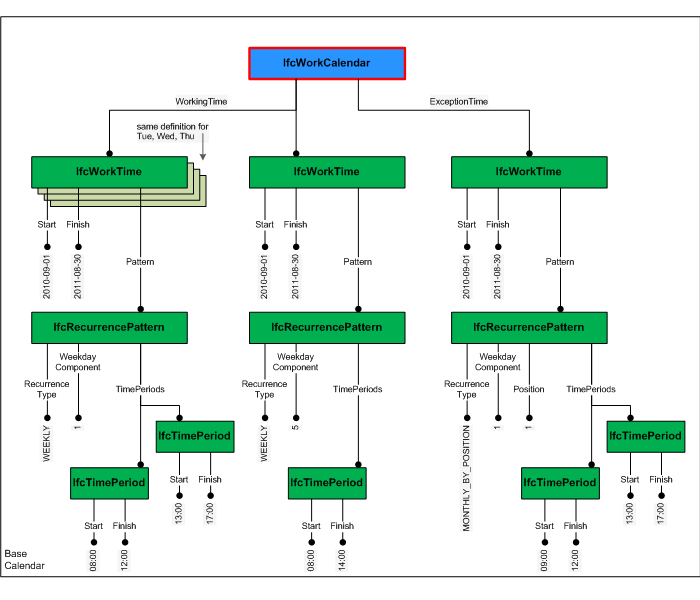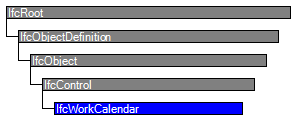Natural language names
 | Arbeitskalender |
 | Work Calendar |
 | Calendrier de travail |
 | Arbeitskalender |
 | Work Calendar |
 | Calendrier de travail |
| Item | SPF | XML | Change | Description | IFC2x3 to IFC4 |
|---|---|---|---|---|
| IfcWorkCalendar | ADDED |
An IfcWorkCalendar defines working and non-working time periods for tasks and resources. It enables to define both specific time periods, such as from 7:00 till 12:00 on 25th August 2009, as well as repetitive time periods based on frequently used recurrence patterns, such as each Monday from 7:00 till 12:00 between 1st March 2009 and 31st December 2009.
HISTORY New entity in IFC4.
A work calendar is a subtype of IfcControl and thus inherits the feature for controlling other objects through IfcRelAssignsToControl, which is used to define a work calendar for tasks (IfcTask) and resources (IfcResource). It also inherits a name and description attribute, whereas a name shall be given and a description may be given as an indication of its content and usage.
The definition of time periods can be derived from a base calendar and/or modified/defined by a set of working times and non-working exception times. All time periods defined by IfcWorkCalendar.ExceptionTimes override the time periods inherited from the base calendar (base calendar is defined as the next applicable calendar for the task or resource). Thus, exception times replace the working times from the base calendar.
Figure 132 shows the definition of a work calendar, which is defined by a set of work times and exception times. The work times are defined as recurring patterns with optional boundaries (applying from and/or to a specific date). The shown example defines a simple work calendar with working times Monday to Thursday 8:00 to 12:00 and 13:00 to 17:00, Friday 8:00 to 14:00 and as exception every 1st Monday in a month the work starts one hour later - i.e. the working time on every 1st Monday in a month is overriden to be 9:00 to 12:00 and 13:00 to 17:00. Both the working time and the exception time is valid for the period of 01.09.2010 till 30.08.2011.
 |
Figure 132 — Work calendar instantiation |
| # | Attribute | Type | Cardinality | Description | C |
|---|---|---|---|---|---|
| 7 | WorkingTimes | IfcWorkTime | S[1:?] | Set of times periods that are regarded as an initial set-up of working times. Exception times can then further restrict these working times. | X |
| 8 | ExceptionTimes | IfcWorkTime | S[1:?] | Set of times periods that define exceptions (non-working times) for the given working times including the base calendar, if provided. | X |
| 9 | PredefinedType | IfcWorkCalendarTypeEnum | [0:1] | Identifies the predefined types of a work calendar from which the type required may be set. | X |
| Rule | Description |
|---|---|
| CorrectPredefinedType | The attribute ObjectType must be asserted when the value of the IfcWorkCalendarTypeEnum is set to USERDEFINED. |

| # | Attribute | Type | Cardinality | Description | C |
|---|---|---|---|---|---|
| IfcRoot | |||||
| 1 | GlobalId | IfcGloballyUniqueId | [1:1] | Assignment of a globally unique identifier within the entire software world. | X |
| 2 | OwnerHistory | IfcOwnerHistory | [0:1] |
Assignment of the information about the current ownership of that object, including owning actor, application, local identification and information captured about the recent changes of the object,
NOTE only the last modification in stored - either as addition, deletion or modification. | X |
| 3 | Name | IfcLabel | [0:1] | Optional name for use by the participating software systems or users. For some subtypes of IfcRoot the insertion of the Name attribute may be required. This would be enforced by a where rule. | X |
| 4 | Description | IfcText | [0:1] | Optional description, provided for exchanging informative comments. | X |
| IfcObjectDefinition | |||||
| HasAssignments | IfcRelAssigns @RelatedObjects | S[0:?] | Reference to the relationship objects, that assign (by an association relationship) other subtypes of IfcObject to this object instance. Examples are the association to products, processes, controls, resources or groups. | X | |
| Nests | IfcRelNests @RelatedObjects | S[0:1] | References to the decomposition relationship being a nesting. It determines that this object definition is a part within an ordered whole/part decomposition relationship. An object occurrence or type can only be part of a single decomposition (to allow hierarchical strutures only). | X | |
| IsNestedBy | IfcRelNests @RelatingObject | S[0:?] | References to the decomposition relationship being a nesting. It determines that this object definition is the whole within an ordered whole/part decomposition relationship. An object or object type can be nested by several other objects (occurrences or types). | X | |
| HasContext | IfcRelDeclares @RelatedDefinitions | S[0:1] | References to the context providing context information such as project unit or representation context. It should only be asserted for the uppermost non-spatial object. | X | |
| IsDecomposedBy | IfcRelAggregates @RelatingObject | S[0:?] | References to the decomposition relationship being an aggregation. It determines that this object definition is whole within an unordered whole/part decomposition relationship. An object definitions can be aggregated by several other objects (occurrences or parts). | X | |
| Decomposes | IfcRelAggregates @RelatedObjects | S[0:1] | References to the decomposition relationship being an aggregation. It determines that this object definition is a part within an unordered whole/part decomposition relationship. An object definitions can only be part of a single decomposition (to allow hierarchical strutures only). | X | |
| HasAssociations | IfcRelAssociates @RelatedObjects | S[0:?] | Reference to the relationship objects, that associates external references or other resource definitions to the object.. Examples are the association to library, documentation or classification. | X | |
| IfcObject | |||||
| 5 | ObjectType | IfcLabel | [0:1] |
The type denotes a particular type that indicates the object further. The use has to be established at the level of instantiable subtypes. In particular it holds the user defined type, if the enumeration of the attribute PredefinedType is set to USERDEFINED.
| X |
| IsDeclaredBy | IfcRelDefinesByObject @RelatedObjects | S[0:1] | Link to the relationship object pointing to the declaring object that provides the object definitions for this object occurrence. The declaring object has to be part of an object type decomposition. The associated IfcObject, or its subtypes, contains the specific information (as part of a type, or style, definition), that is common to all reflected instances of the declaring IfcObject, or its subtypes. | X | |
| Declares | IfcRelDefinesByObject @RelatingObject | S[0:?] | Link to the relationship object pointing to the reflected object(s) that receives the object definitions. The reflected object has to be part of an object occurrence decomposition. The associated IfcObject, or its subtypes, provides the specific information (as part of a type, or style, definition), that is common to all reflected instances of the declaring IfcObject, or its subtypes. | X | |
| IsTypedBy | IfcRelDefinesByType @RelatedObjects | S[0:1] | Set of relationships to the object type that provides the type definitions for this object occurrence. The then associated IfcTypeObject, or its subtypes, contains the specific information (or type, or style), that is common to all instances of IfcObject, or its subtypes, referring to the same type. | X | |
| IsDefinedBy | IfcRelDefinesByProperties @RelatedObjects | S[0:?] | Set of relationships to property set definitions attached to this object. Those statically or dynamically defined properties contain alphanumeric information content that further defines the object. | X | |
| IfcControl | |||||
| 6 | Identification | IfcIdentifier | [0:1] | An identifying designation given to a control It is the identifier at the occurrence level. | X |
| Controls | IfcRelAssignsToControl @RelatingControl | S[0:?] | Reference to the relationship that associates the control to the object(s) being controlled. | X | |
| IfcWorkCalendar | |||||
| 7 | WorkingTimes | IfcWorkTime | S[1:?] | Set of times periods that are regarded as an initial set-up of working times. Exception times can then further restrict these working times. | X |
| 8 | ExceptionTimes | IfcWorkTime | S[1:?] | Set of times periods that define exceptions (non-working times) for the given working times including the base calendar, if provided. | X |
| 9 | PredefinedType | IfcWorkCalendarTypeEnum | [0:1] | Identifies the predefined types of a work calendar from which the type required may be set. | X |
Control Assignment
The Control Assignment concept applies to this entity.
The base calendar of a work calendar is defined by IfcRelAssignsToControl, where IfcRelAssignsToControl.RelatingControl is linked with the base calendar and IfcRelAssignsToControl.RelatedObjects is linked with work calendars that are derived from the base calendar. Although not restricted by the IfcRelAssignsToControl relationship it is only allowed to have one base calendar.
| # | Concept | Model View |
|---|---|---|
| IfcRoot | ||
| Software Identity | Common Use Definitions | |
| Revision Control | Common Use Definitions | |
| IfcObject | ||
| Object Occurrence Predefined Type | Common Use Definitions | |
| IfcControl | ||
| IfcWorkCalendar | ||
| Control Assignment | Common Use Definitions | |
<xs:element name="IfcWorkCalendar" type="ifc:IfcWorkCalendar" substitutionGroup="ifc:IfcControl" nillable="true"/>
<xs:complexType name="IfcWorkCalendar">
<xs:complexContent>
<xs:extension base="ifc:IfcControl">
<xs:sequence>
<xs:element name="WorkingTimes" nillable="true" minOccurs="0">
<xs:complexType>
<xs:sequence>
<xs:element ref="ifc:IfcWorkTime" maxOccurs="unbounded"/>
</xs:sequence>
<xs:attribute ref="ifc:itemType" fixed="ifc:IfcWorkTime"/>
<xs:attribute ref="ifc:cType" fixed="set"/>
<xs:attribute ref="ifc:arraySize" use="optional"/>
</xs:complexType>
</xs:element>
<xs:element name="ExceptionTimes" nillable="true" minOccurs="0">
<xs:complexType>
<xs:sequence>
<xs:element ref="ifc:IfcWorkTime" maxOccurs="unbounded"/>
</xs:sequence>
<xs:attribute ref="ifc:itemType" fixed="ifc:IfcWorkTime"/>
<xs:attribute ref="ifc:cType" fixed="set"/>
<xs:attribute ref="ifc:arraySize" use="optional"/>
</xs:complexType>
</xs:element>
</xs:sequence>
<xs:attribute name="PredefinedType" type="ifc:IfcWorkCalendarTypeEnum" use="optional"/>
</xs:extension>
</xs:complexContent>
</xs:complexType>
ENTITY IfcWorkCalendar
SUBTYPE OF (IfcControl);
WorkingTimes : OPTIONAL SET [1:?] OF IfcWorkTime;
ExceptionTimes : OPTIONAL SET [1:?] OF IfcWorkTime;
PredefinedType : OPTIONAL IfcWorkCalendarTypeEnum;
WHERE
CorrectPredefinedType : NOT(EXISTS(PredefinedType)) OR (PredefinedType <> IfcWorkCalendarTypeEnum.USERDEFINED) OR
((PredefinedType = IfcWorkCalendarTypeEnum.USERDEFINED) AND EXISTS(SELF\IfcObject.ObjectType));
END_ENTITY;